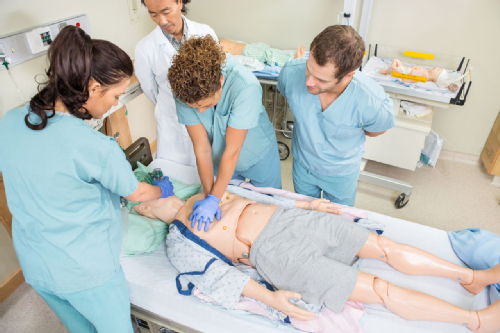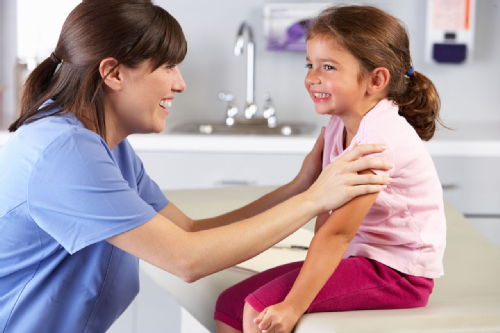All 4 entries tagged Sarah
View all 11 entries tagged Sarah on Warwick Blogs | View entries tagged Sarah at Technorati | There are no images tagged Sarah on this blog
January 16, 2015
Happy New Year!
Happy New Year
Christmas is over, and it’s time to return to hospital. I had a really nice 2 week break and got to spend some time with my family and friends, and I didn’t open a textbook or read a medical article once! I love not having exams in January.

This is my last block of “general clinical education” before finals and I am currently placed in Acute Medicine. Acute block covers Accident & Emergency and EMU, AMU or whatever acronym a hospital has chosen to call their admissions unit. We also have various lectures and simulation sessions which use SimMan mannequins to let us practice assisting at and leading various medical emergencies.
The most advanced SimMan has a pulse, breathes, can speak and make noises, and can even be sick. Oh and you can catheterise him, which gives you some idea how anatomically correct he is. In Sim sessions the SimMan is programmed to have a specific condition and reacts to the interventions that you give him, which makes it pretty realistic!
We also see real patients on Acute Block, both in ED (Emergency Department) and after admission on post take ward rounds. ED is a great place to be as a medical student as you get to see patients when they are, “fresh,” and before anybody else has influenced your thinking with their diagnosis or management plan. On the ward it’s easy to slip in some obscure differential diagnosis when you’ve heard it muttered by the registrar, you’re thinking on your own in ED!
This is the place where you can clerk patients, order tests (under supervision) and suggest what you would do next, and the place where, when things are going well, you most feel like you can and will be a doctor one day. Because it’s often so busy, juniors are more than happy for you to help out and patients are generally happy to see you as you can sometimes speed things up a little bit for them.
Acute Medicine is also a great block to finish medical school on, as you literally have no idea what will walk through the door and you have to be able to pull any focussed history or examination out of the bag, and do it well. This is different to other blocks where you know that you’re doing a cardiology ward round, so it might be a good idea to read up on cardiology…
Having spent the last 3 and a half years saying, “I will start revising properly for finals after Christmas of 4th year,” the time has finally come. I’m sure the next few months are going to be pretty stressful, but I’m finding it satisfying to see how all the knowledge and skills I’ve learnt are slowly starting to knit together and make some sense. There is light at the end of the medical school tunnel, and I can see it now.
December 10, 2014
Working 9–5 (and then 6–11) is no way to make a living…

I’ve had a part time job for most of my life since I got a paper round aged 14. I’m lucky in that my parents help me out financially when they are able to, but I’ve always felt better about accepting their help in the knowledge that I have made at least some effort to earn some cash myself.
I knew that working whilst at medical school might be tricky as we do have a lot of work to do outside hospital hours, and I’ve also had to do some out-of-hours hospital shifts in the evenings and at weekends.
Currently, I work at a bar on the university campus, doing one or two, four or five hour shifts a week. This means that I often have to go straight from hospital to work, which means I can be out of the house for a good 16 hours.
Although it is hard work, I have found that working in something completely non-medical can actually be quite relaxing. It’s nice to be able to turn up, switch off to a certain extent, and pour pints for a few hours. I’ve also made a few non-medical friends along the way, which is a really nice thing to have when you’re fed up of talking to your medic housemates about whether or not they could hear the patient’s heart murmur on Ward 11, how long is it until finals (in days, hours, minutes, and seconds) and how many cannulations they’ve managed to do this week, when you last did a successful one about a month ago.
The one thing that I have learnt at work though is to be very careful about who you tell that you’re a medical student. Obviously our customers talk to us, and lots of us are students so they ask us what we’re studying. Usually when I say medicine, people often react in one of 3 ways:
- “Oooo you must be clever!” (No, if I was clever I would have done dentistry and be earning loads of money by now, rather than doing a full time course and working here in the evenings).
- “Ohhhh you’re going to be so rich, I read in the Daily Mail recently that all GP’s earn £150k a year…” (Not true, I did actually think that being a doctor would make me rich, mostly thanks to the Daily Mail, but after further examination of the facts, it was revealed that this is sadly inaccurate.)
- “Oh interesting you should say that, I’ve had this stomach ache for a while now….” (Please continue to tell me about your bowel movements in excruciating detail at a volume that the whole bar can hear. But seriously, go and see your GP.)
Now, it is nice that people want to show an interest in you and share their medical stories with you, but after a long day at hospital and when you view yourself as, “off duty,” it isn’t always great. Unfortunately, I’m a really bad liar, so the occasions when I’ve told people that I study economics haven’t worked out very well, mostly because our bar is next door to Warwick Business School, which is full of people studying economics.
Alternatively, there is the option that one customer told me that his doctor-wife uses to avoid people asking her medical opinion at dinner parties, which is to tell everyone that she works in the GUM clinic…
December 02, 2014
Honey, I shrunk the patients
Last month, I was filled with dread as I approached the end of my senior surgical block. Not because I am gunning to become a surgeon and would miss scrubbing in during theatre sessions (quite the opposite!) but because I could see my“child health” block looming on the horizon.
Prior to this placement, I had absolutely no experience with children. I am the youngest in my family and I don’t have the hordes of nieces and nephews that other people appear to have acquired during their early 20s. Children were like tiny aliens to me, and the thought of even changing a nappy, let along trying to take a history from a screaming 6 year old instilled a deep sense of panic in me.
We had three days of introductory lectures before starting clinical placement, during which we learnt that everything that can go wrong in an adult can also go wrong with a child. On top of this, children can also suffer from a variety of often quite bizarre and rare conditions not found in older people. After these lectures we were sent out to our hospitals with strict instructions to “see lots of children.”

The month since then has been my favourite month of medical school. My fears were completely unfounded, and working with children has been amazing. I really like that in every paeds consultation there are at least two patients – the child and their carer. Both of their problems and concerns have to be explored and addressed, and the solution has to be acceptable to both.
A big difference between child and adult patients is their willingness to be examined by a student. Although obviously some children are shy, at a certain age many of them are more than willing to show off whatever ailment they have to anyone nearby who will have a look, which is very useful for learning. As a medical student you get quite used to getting sent out of adult consultations so this has been quite refreshing! Less fortunately, children also tend to have less control over their bodily functions than most adults, so if you are squeamish when it comes to getting covered in whatever happens to be coming out of a child at the time, then maybe paeds isn’t for you!
Children get ill quickly but they get better quickly as well, and in A&E I have seen really quite poorly children being given the correct treatment then bounce out of the department a few hours later, which is really satisfying!
Neonates and infants provide their own challenges, as they can’t communicate that they are unwell. One of my consultants likened paediatrics to veterinary medicine for this reason, and paediatricians have to rely on their examination skills and clinical acumen to work out what is going on with a child.
Whilst on this placement I have had the opportunity to clerk sick patients in A&E, helped to resuscitate neonates on SCBU, hold supervised clinic sessions and do some work on the wards. Oh and I’ve also now changed that all important nappy!
November 24, 2014
Hello

My name is Sarah and I am currently a final year medical student at Warwick. For my first post, I wanted to tell you a bit about myself and my path to studying medicine here.
I did my first degree at Manchester University, where I studied biomedical science. I thought that I wanted to work in research, but during my final year research project I realised that I enjoyed my clinical lectures much more, and decided to apply for medicine. I had done some work experience at a local hospice, and also shadowed a GP for a few days so I gave it a go. The first year, I didn’t even get an interview anywhere, which I was pretty gutted about.
I then spent the months after graduation (in 2010, when the recession was doing its worst) doing a variety of awful jobs to earn some money whilst I regrouped and reapplied. This time, I got an interview at Warwick, and a few months later found out that I had been accepted. I hadn’t had an interview anywhere else, which I think goes to show that perseverance and self-belief are pretty essential in the lottery that is the medical school applications system!
If you are reading this and wondering about whether you should bother applying to medicine or not, because the odds of getting in are so small, then you should stop wondering and apply! I never thought that I would get a place, and I didn’t think that I had the right background or experience.
It actually turned out that the student body at Warwick is pretty diverse. In my house alone we have someone who studied psychology, a neuroscientist, a sports scientist and a research chemist who worked in the pharmaceutical industry before applying. I also know a few physicists, a midwife, a nurse and a pharmacist. Since I applied, Warwick’s entry requirements have changed to include non-science degrees, so there is even more diversity now.
The one piece of advice that I would give to you if you are applying to medicine is to sit down before your interview and think not only about what work experience you have done, but also about what that work experience has taught you. Everyone can say, “I shadowed a GP for 3 days,” but not everyone will have reflected on what this has taught them about medicine as a career. Reflecting on your experiences is a really important part of working as a doctor, and everybody from medical students up to consultants has to do it, so you might as well start now!
Since starting at Warwick, I have been through 18 months of pre-clinical education and then 18 months of clinical placements in medicine, surgery, anaesthetics, orthopaedics, general practice, psychiatry, obstetrics and child health. I only have my emergency medicine block left before finals, which is quite a terrifying thought!
I hope to use this blog to give you some perspective of what it is like to be almost at the end of the marathon that is medical school, and what it is like to sit finals.
 Megan Earle
Megan Earle

 Please wait - comments are loading
Please wait - comments are loading
 Loading…
Loading…